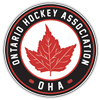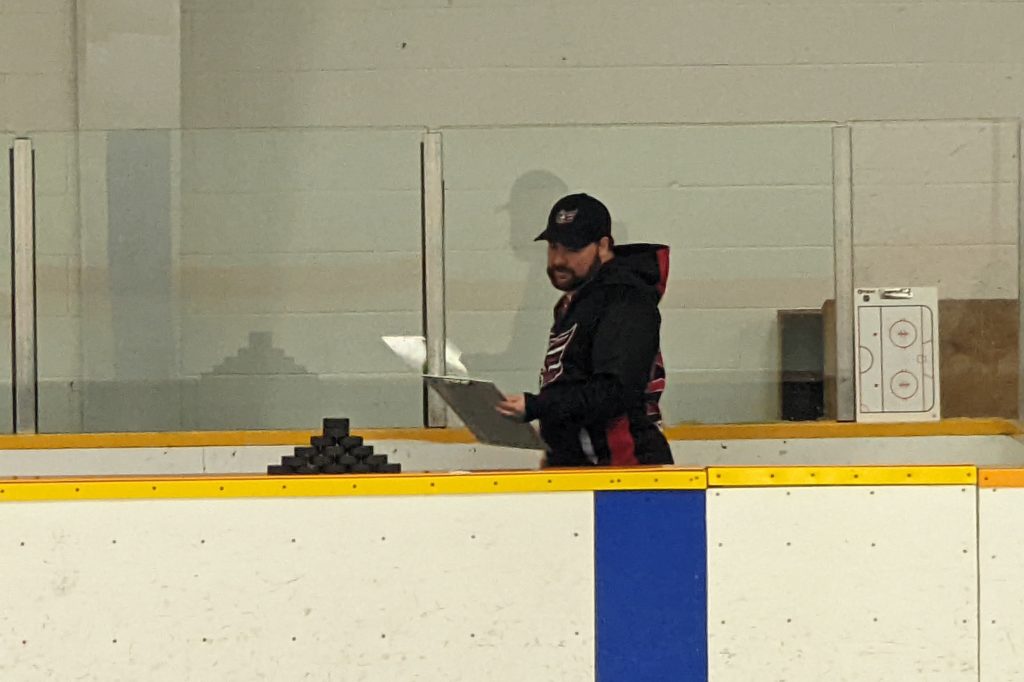He’s arguably the busiest man within the Clarington Eagles’ organization.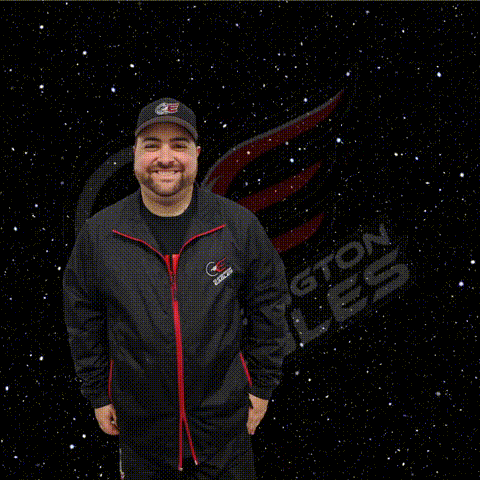
Yes, Craig Wilcox wears many hats for the local Provincial Junior Hockey League squad.
Wilcox is the Eagles’ head trainer, equipment manager, assistant general manager and alternate governor.
A much closer look at Wilcox and his involvement in the community and with the Eagles follows.
Q: Being born and raised in Bowmanville, being an Eagles’ fan, how does it feel to be a member of the organization?
A: For me it is a massive honour to wear the logo and represent this franchise. Yes, I was a fan of the team, especially during high school when some of my friends played for the team. But the fact that my dad played between the pipes here during the 1977-78 season, my cousin played between the pipes here during 80’s and early 90’s, plus my cousin was the captain before COVID hit and ended the season prematurely, it’s a huge honour to be a part of an organization that my family has been a part of for decades and has meant so much to the community. I have a lot of great memories watching the Eagles when I was younger and am very proud to be making memories with them now.
Q: Having never played hockey as a child, how did you get to become involved in working with minor hockey? Could you walk us through the journey you took to get here?
A: Well, you’re right, I never played hockey as a child. I loved to skate as a kid, so I tried playing Squirts one year, and that didn’t go very well. I’d go and sit in the corner and cry when someone took the puck off me, so I knew then I wasn’t going to be much of a player. I watched a lot of hockey as a kid and studied the game, but I never played. I was a baseball player. If I could have played baseball 12 months out of the year, I would have. I can’t even skate anymore! (Eagles’ defenceman) Nate (Baumhauer) is trying to get me to put the blades on one time before he ages out, but I can’t see myself going out there and embarrassing myself in front of these guys.
I got my start in hockey, believe it or not, working with my dad’s 35-and-over team when I was very young. Just used to go and hang out before and after games, and it led to me being an equipment manager, taking care of the jerseys for the team. I was involved with them for over 10 years. Being part of that team got me my first job too, working at Hooper’s Trophies. With minor hockey, my first experience in high-end competitive rep hockey was during the 2016-17 season with the Clarington Bantam AAA’s. Scott Webster was the one who gave me my start in minor hockey. Webby brought me in to work as an assistant manager and statistician with his team and if he hadn’t have done that for me, I would have never gotten involved in hockey at all and wouldn’t be with the Eagles today. So, I owe him a great deal for giving me my start. (Current Eagles’ coach) Dean (Baumhauer) happened to be one of Webby’s assistant coaches at that time and asked me to go to Whitby with him as his trainer and manager for the following season. We won the silver medal that year at the OMHA’s and we both ended up in Junior the following season. Dean joined the Whitby Fury and I was lucky enough to have been hired by Dave Miller to work with the Eagles as the assistant trainer and equipment manager after only two seasons in minor hockey. Later in the season I was brought in to assist the Whitby Fury as an equipment manager as well. I feel extremely lucky that I’ve had the chance to work with some great coaches and have two awesome mentors in Wes Jackson and Amanda Gilroy who have helped me develop and become a better trainer. This is my fourth season with the Eagles, and I’m just thrilled to be here.
Q: You’ve worked side-by-side with Dean in various roles now over the past four seasons. How do you think Dean manages to make his teams so successful and how does working in the front office together differ from working at ice level together?
A: No disrespect to any of the other coaches I’ve worked under, but he’s the best. He’s number one. The GOAT as the kids these days would say. His accomplishments in minor hockey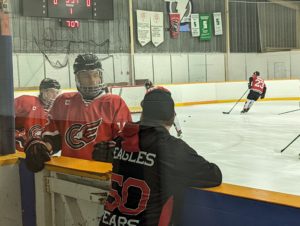 are unbelievable. He’s won eight OMHA medals and two OHF medals in his career. He is a sure thing to make the Clarington Sports Hall of Fame one day. Just go to Rickard Arena and look up in the rafters. The majority of those banners are from teams he coached. Everywhere he goes the team instantly becomes successful. Dean has a system where he gets the best out of all his players and it creates individual and team success. He’s able to do all of this while keeping the atmosphere light and making sure all the players, and his staff, are having a lot of fun doing it. I witnessed first-hand during our season together with the Whitby Midgets how Dean was able to lead a team of “misfits” or “everybody else’s scraps” paired with the best goalie in the league to an OMHA silver medal. The whole league thought we were going to finish at the bottom of the standings and go winless in the OMHA championships. Instead, we battled all year long, came second in the regular season standings and won the silver medal at the OMHA championships. I was looking back on that team of “scraps” the other day, and when I started to do the math, I realized that fifteen of the nineteen players made it to Junior hockey, and one other went to Europe to play. On top of that, the five main affiliated players we used that season from the Minor Midget team all got drafted to the OHL, with four of them still playing in the OJHL. That’s incredible. Because we have worked together for so many years, working with him in the front office isn’t any different than working with him at ice level. We work well together. We text on a daily basis, just throwing various ideas back and forth at each about ways to improve the team. We talk a lot of hockey in general. We argue a lot, but we always end up on the same page at the end. I always joke that we fight like father and son as opposed to brothers because he’s so much older than me. We think a lot alike, and we both have a passion to win and make the team the best that we can. With Dean becoming the GM of the team at the start of last season, that set the team up for even more success and I’m just happy to be able to continue working beside him, be a part of this amazing group and assist him and our players in any way that I can.
are unbelievable. He’s won eight OMHA medals and two OHF medals in his career. He is a sure thing to make the Clarington Sports Hall of Fame one day. Just go to Rickard Arena and look up in the rafters. The majority of those banners are from teams he coached. Everywhere he goes the team instantly becomes successful. Dean has a system where he gets the best out of all his players and it creates individual and team success. He’s able to do all of this while keeping the atmosphere light and making sure all the players, and his staff, are having a lot of fun doing it. I witnessed first-hand during our season together with the Whitby Midgets how Dean was able to lead a team of “misfits” or “everybody else’s scraps” paired with the best goalie in the league to an OMHA silver medal. The whole league thought we were going to finish at the bottom of the standings and go winless in the OMHA championships. Instead, we battled all year long, came second in the regular season standings and won the silver medal at the OMHA championships. I was looking back on that team of “scraps” the other day, and when I started to do the math, I realized that fifteen of the nineteen players made it to Junior hockey, and one other went to Europe to play. On top of that, the five main affiliated players we used that season from the Minor Midget team all got drafted to the OHL, with four of them still playing in the OJHL. That’s incredible. Because we have worked together for so many years, working with him in the front office isn’t any different than working with him at ice level. We work well together. We text on a daily basis, just throwing various ideas back and forth at each about ways to improve the team. We talk a lot of hockey in general. We argue a lot, but we always end up on the same page at the end. I always joke that we fight like father and son as opposed to brothers because he’s so much older than me. We think a lot alike, and we both have a passion to win and make the team the best that we can. With Dean becoming the GM of the team at the start of last season, that set the team up for even more success and I’m just happy to be able to continue working beside him, be a part of this amazing group and assist him and our players in any way that I can.
Q: When people say, “It’s just Junior C,” how do you respond to that?
A: When my dad played in the 1970s for Clarington and Port Hope, it was really good hockey, but at any moment a brawl could, and often would break out involving everybody in the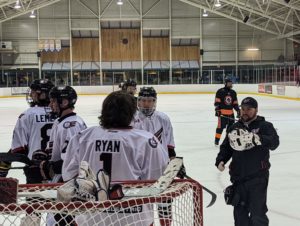 arena, fans and arena staff included. I remember him telling me about a time in Alliston when the hometown fans busted open the pop machine and were throwing pop cans at the Eagles on the ice. The fans also smashed all the windows on their team bus, which made for a fun ride home in the middle of the winter. Those days are gone now, and the game has completely changed, but there is still that stigma about Junior C that it’s a “fighter” league or a “goon” league. Sure, fights happen, but not as often as they used to. Junior C is great hockey. We played some really great hockey games this season against some really talented hockey teams with some unbelievable players. Little Britain has three of the most talented players I’ve seen play in this league over my four years here. It’s always a great hockey game when you play teams of that calibre. Junior C, actually the PJHL, might be an even more competitive league overall than it was when my dad played, and it’s great because it’s designed for various types of hockey players – some who want to work, some who want to attend school, some who want less of a travel commitment, some who don’t want the rigours of a Junior A schedule, some who can’t afford to play Junior A hockey and some who just want to play for their hometown team with their friends. However, it doesn’t mean that players have no opportunities to go somewhere with hockey. It’s a great place to better yourself and develop your skills further for when you get to the next level. A perfect example of a player who started out in Junior C and has gone far is Carson Gallagher. He played a season for the Eagles, went on to play a couple seasons in the OJHL, joined a team in the USHL and now has a scholarship at Sacred Heart University. Junior C was his first stop in junior hockey and that played a part in getting him where he is today. Joey Campbell and Mitch Doyle are other examples of what Junior C hockey is all about. Both could have stayed and played in the OJHL for another couple seasons, hands down would have remained on their teams and would have been top contributors, but both wanted to come and play for their hometown team. The PJHL is a great place to play competitive hockey and I encourage as many players as possible to try it out and see for themselves just how great the hockey really is. It’s ultimately up to the players to remove the stigma of “it’s only Junior C” from the general conversation.
arena, fans and arena staff included. I remember him telling me about a time in Alliston when the hometown fans busted open the pop machine and were throwing pop cans at the Eagles on the ice. The fans also smashed all the windows on their team bus, which made for a fun ride home in the middle of the winter. Those days are gone now, and the game has completely changed, but there is still that stigma about Junior C that it’s a “fighter” league or a “goon” league. Sure, fights happen, but not as often as they used to. Junior C is great hockey. We played some really great hockey games this season against some really talented hockey teams with some unbelievable players. Little Britain has three of the most talented players I’ve seen play in this league over my four years here. It’s always a great hockey game when you play teams of that calibre. Junior C, actually the PJHL, might be an even more competitive league overall than it was when my dad played, and it’s great because it’s designed for various types of hockey players – some who want to work, some who want to attend school, some who want less of a travel commitment, some who don’t want the rigours of a Junior A schedule, some who can’t afford to play Junior A hockey and some who just want to play for their hometown team with their friends. However, it doesn’t mean that players have no opportunities to go somewhere with hockey. It’s a great place to better yourself and develop your skills further for when you get to the next level. A perfect example of a player who started out in Junior C and has gone far is Carson Gallagher. He played a season for the Eagles, went on to play a couple seasons in the OJHL, joined a team in the USHL and now has a scholarship at Sacred Heart University. Junior C was his first stop in junior hockey and that played a part in getting him where he is today. Joey Campbell and Mitch Doyle are other examples of what Junior C hockey is all about. Both could have stayed and played in the OJHL for another couple seasons, hands down would have remained on their teams and would have been top contributors, but both wanted to come and play for their hometown team. The PJHL is a great place to play competitive hockey and I encourage as many players as possible to try it out and see for themselves just how great the hockey really is. It’s ultimately up to the players to remove the stigma of “it’s only Junior C” from the general conversation.
Q: What’s next for Craig Wilcox? What’s next for the Clarington Eagles when this playoff run ends?
A: Craig Wilcox is going on vacation. Not sure where yet, but somewhere that I can lie around in the sun for a week or two, sip a couple cold drinks and relax. But that isn’t happening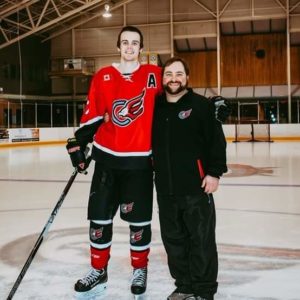 until at least May 16th because I feel we have a very strong chance of making the Schmalz Cup tournament. But after a mini vacation to recharge the batteries, it’s back to work. I’ve already begun discussions with Dean about some players we’d like to recruit that are graduating from Minor Hockey and will begin reaching out to them shortly. We’ll get a summer camp set up and just see where the pieces fall. We have some big holes to fill heading into next season, but we still have a strong core returning. I’m excited to get the ball rolling, but at the moment, I’m 100% focused on the series against the Little Britain Merchants and doing whatever I can to help get my team prepared for each game. Everybody is all in right now and that’s all I’m truly focused on.
until at least May 16th because I feel we have a very strong chance of making the Schmalz Cup tournament. But after a mini vacation to recharge the batteries, it’s back to work. I’ve already begun discussions with Dean about some players we’d like to recruit that are graduating from Minor Hockey and will begin reaching out to them shortly. We’ll get a summer camp set up and just see where the pieces fall. We have some big holes to fill heading into next season, but we still have a strong core returning. I’m excited to get the ball rolling, but at the moment, I’m 100% focused on the series against the Little Britain Merchants and doing whatever I can to help get my team prepared for each game. Everybody is all in right now and that’s all I’m truly focused on.

 Alliston Hornets
Alliston Hornets Huntsville Otters
Huntsville Otters Innisfil Spartans
Innisfil Spartans Midland Flyers
Midland Flyers Muskoka Bears
Muskoka Bears Orillia Terriers
Orillia Terriers Penetang Kings
Penetang Kings Stayner Siskins
Stayner Siskins Fergus Whalers
Fergus Whalers Goderich Flyers
Goderich Flyers Hanover Barons
Hanover Barons Kincardine Bulldogs
Kincardine Bulldogs Mitchell Hawks
Mitchell Hawks Mount Forest Patriots
Mount Forest Patriots Walkerton Capitals
Walkerton Capitals Wingham Ironmen
Wingham Ironmen Caledon Golden Hawks
Caledon Golden Hawks Clarington Eagles
Clarington Eagles Georgina Ice
Georgina Ice Little Britain Merchants
Little Britain Merchants Port Perry Lumberjacks
Port Perry Lumberjacks Schomberg Cougars
Schomberg Cougars Uxbridge Bruins
Uxbridge Bruins Amherstview Jets
Amherstview Jets Trent Hills Thunder
Trent Hills Thunder Frankford Huskies
Frankford Huskies Lakefield Chiefs
Lakefield Chiefs Napanee Raiders
Napanee Raiders North Kawartha Knights
North Kawartha Knights Picton Pirates
Picton Pirates Port Hope Panthers
Port Hope Panthers Amherstburg Admirals
Amherstburg Admirals Blenheim Blades
Blenheim Blades Dresden Jr. Kings
Dresden Jr. Kings Essex 73's
Essex 73's Lakeshore Canadiens
Lakeshore Canadiens Mooretown Flags
Mooretown Flags Walpole Island Wild
Walpole Island Wild Wheatley Omstead Sharks
Wheatley Omstead Sharks Aylmer Spitfires
Aylmer Spitfires Exeter Hawks
Exeter Hawks Lucan Irish
Lucan Irish Mt.Brydges Bulldogs
Mt.Brydges Bulldogs North Middlesex Stars
North Middlesex Stars Petrolia Flyers
Petrolia Flyers Port Stanley Sailors
Port Stanley Sailors Thamesford Trojans
Thamesford Trojans Dundas Blues
Dundas Blues Dunnville Jr. Mudcats
Dunnville Jr. Mudcats Glanbrook Rangers
Glanbrook Rangers Grimsby Peach Kings
Grimsby Peach Kings Hagersville Hawks
Hagersville Hawks Niagara RiverHawks
Niagara RiverHawks Port Dover Sailors
Port Dover Sailors Streetsville Derbys
Streetsville Derbys Dorchester Dolphins
Dorchester Dolphins Hespeler Shamrocks
Hespeler Shamrocks New Hamburg Firebirds
New Hamburg Firebirds Norwich Merchants
Norwich Merchants Paris Titans
Paris Titans Tavistock Braves
Tavistock Braves Wellesley Applejacks
Wellesley Applejacks Woodstock Navy Vets
Woodstock Navy Vets